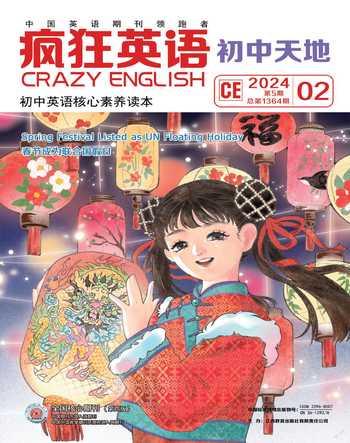Chinese New Year’s Customs and Traditions中国新年的习俗与传统
李姗姗
新年(春節)是中国最重要的传统节日之一。这个节日有着丰富多彩的习俗和传统,让我们一起来了解一下吧!
As Chinese New Year approaches, aseries of customs and traditions, rich incultural heritage, mark this festive season.These customs not only 1)deepenthe festive atmosphere butalso show the strongfamilial bonds inChinese culture.
Little New Year: worship of the Kitchen God
The Little New Year, usually a week before the lunarNew Year, occurs on the twenty-third or twenty-fourth dayof the twelfth lunar month. It is also known as the Festivalof the Kitchen God. It is believed that on this day, theKitchen God comes to Heaven to report on the familysactivities throughout the year. To ensure a favorablereport, families prepare sweet foods like sesame sugarpancakes, hoping to sweeten the KitchenGods words and bring good fortune forthe coming year.
Preparing for the New Year
In the days following, several rituals andpreparations take place. On the twentyfourthday, households engage in a thoroughcleaning, symbolizing the sweeping away of bad luck to makeroom for incoming good fortune. This tradition, known as“sweeping the dust”, involves cleaning every corner of the house,washing 2)utensils, and clearing away cobwebs, to set the stagefor a fresh start. On the twenty-sixth day, families begin buyingNew Years goods and preparing festive meals. The twentyseventhday and twenty-eighth day are marked by 3)purchasingand preparing various items needed for the celebration, includingmaking staple foods for the family reunion dinner.
New Years Eve: a day of vigilance and celebration
The last day of the twelfth lunar month, either thetwenty-ninth or thirtieth day, depending on the lunarcalendar, is New Years Eve. This day is filled with busypreparations, including a significantactivity known as “visiting the gravesof ancestors” to pay respects andseek blessings. At night, families stayup late or “keep vigil” to ward off themythical beast—Nian, symbolizing thewarding off of evil spirits.
The first day of the New Year: greetings and red envelopes
On the f i r s t day of the New Year, familiesexchange greetings and blessings. Elders givered envelopes to younger family membersas a symbol of good luck. Traditionalmeals, including dumplings in the northand wontons in the south, are enjoyed,symbolizing prosperity and longevity.
The second day of the New Year: family reunions
The second day, known as the “day of the first outing”,is when daughters who have married return to theirparents homes with their husbands. This day is significantfor newlyweds, as they follow specific customs, such asbringing pairs of gifts to signify harmony.
Subsequent days: various customs and rituals
The following days, up to the fifteenth day, are filledwith various customs. For example, the fifth day, issignificant for business, marking the day for welcoming theGod of Wealth. On the seventh day,people usually make a specialdish made of seven types ofvegetables, symbolizing thehope for a bountiful harvest.
These customs, steeped in history and tradition, not only mark the4)advent of the New Year but also reinforce the value of family, respectfor the past, and hope for a prosperous future.
1) deepen v. 加深
2) utensil n. 器具
3) purchase v. 购买
4) advent n. 到来
词组加油站
be filled with 充满……
stay up 熬夜
ward off 阻挡
随着中国新年的临近,一系列充满文化底蕴的习俗和传统标志着这个节日的开始。这些习俗不仅增强了节日气氛,而且体现了中华文化中强烈的家庭纽带。
小年:祭拜灶神
小年通常是农历新年的前一周,即腊月二十三或腊月二十四,也被称为灶神节。人们相信在这一天,灶神升天向天庭报告一年来家庭的活动。为了确保有利的报告,家家户户准备甜食,如芝麻糖饼,希望灶神多说好话,为来年带来好运。
为新年做准备
接下来的几天会进行几项仪式和准备。腊月二十四,家家户户进行大扫除,象征着扫除坏运,为即将到来的好运腾出空间。这一传统,被称为“扫尘”,包括清洁房屋的每一个角落,洗涤器具,清除蜘蛛网,为新的开始打下基础。腊月二十六,家家户户开始购买新年物品并准备节日餐食。腊月二十七和二十八标志着购买和准备庆祝新年活动所需的各种物品,包括制作年夜饭的主食。
除夕:缅怀与庆祝的一天
农历十二月的最后一天,可能是腊月二十九或三十,是除夕。这一天充满了忙碌的准备,包括一项重要的民俗活动——“祭祀先祖”,以寄托哀思和寻求祝福。到了晚上,人们会熬夜或“守岁”,以驱逐神话中的怪兽——年,象征着驱逐邪灵。
新年第一天:問候与红包
在新年的第一天,家庭成员互相问候和祝福。长辈会给晚辈红包,这是一种好运的象征。人们会享用传统的餐食,比如北方吃饺子,南方吃馄饨,这些象征着繁荣和长寿。
新年第二天:家庭团聚
新年的第二天,被称为“初次外出的日子”,是已嫁女儿带着丈夫返回父母家的日子。对于新婚夫妇来说,这一天尤其重要,他们遵循特定的习俗,比如带上成双成对的礼物,以象征和谐。
后续日子:各种习俗和仪式
接下来的日子,一直到正月十五,还有各种习俗。例如,大年初五,对于商家来说是重要的一天,这一天要迎财神,祈求一年财源广进。大年初七,人们会用七种蔬菜煮成七宝羹,祈求大丰收。
这些习俗,浸透了历史和传统,不仅标志着新年的到来,而且强化了家庭的价值、对过去的尊重以及对繁荣未来的希望。

